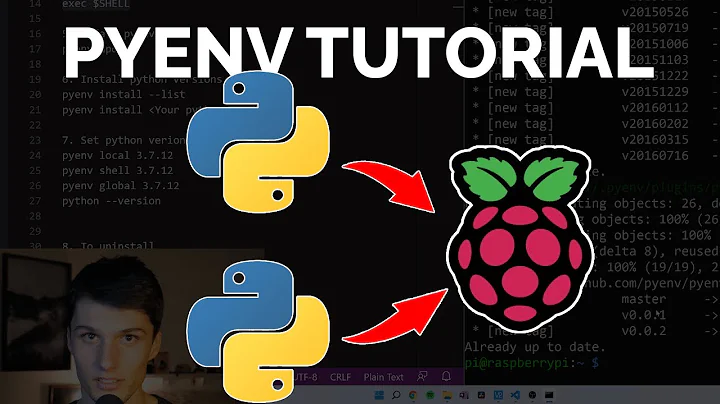How can I make homebrew's python and pyenv live together?
Solution 1
You can install pyenv in your home directory (as described in pyenv's installation guide), and then create a symlink at ~/.pyenv/versions to $(brew --cellar)/python:
ln -s $(brew --cellar python)/* ~/.pyenv/versions/
The way Homebrew works nowadays, this will pick up both 2.x and 3.x.
Solution 2
A handy function to relink versions:
pyenv-brew-relink() {
rm -f "$HOME/.pyenv/versions/*-brew"
for i in $(brew --cellar python)/*; do
ln -s --force $i $HOME/.pyenv/versions/${i##/*/}-brew;
done
for i in $(brew --cellar python@2)/*; do
ln -s --force $i $HOME/.pyenv/versions/${i##/*/}-brew;
done
}
Solution 3
Just to add to @johnizzo1's answer, python2 is now python@2, so you should change the python3 for loop to something like:
for i in `ls $(brew --cellar python)/`; do
ln -s $(brew --cellar python)/$i $HOME/.pyenv/versions/$i-brew;
done
for i in `ls $(brew --cellar python@2)/`; do
ln -s $(brew --cellar python@2)/$i $HOME/.pyenv/versions/$i-brew;
done
Solution 4
Well if you want the pyenv pythons and homebrew pythons to live together you need to make the name of the homebrew pythons something other than the version. Otherwise they will clash with the directory names that pyenv uses. For example, if you want to install pyenv python 2.7.11 and homebrew python 2.7.11 you could do something like this.
for i in `ls $(brew --cellar python)/`; do
ln -s $(brew --cellar python)/$i $HOME/.pyenv/versions/$i-brew;
done
for i in `ls $(brew --cellar python3)/`; do
ln -s $(brew --cellar python)/$i $HOME/.pyenv/versions/$i-brew;
done
Essentially this will create a directory in $HOME/.pyenv/versions appended with '-brew' so that it won't clash with the pyenv pythons.
Solution 5
pyenv will use system as default version when version is not specified.
When you install python@3 by homebrew and pyenv's version is specified to system, python points to python 2.x in the system and python3 points to python@3 which installed by homebrew.
So usually we don't need to manually add version to pyenv.
Example: add macos system python 2.7 to pyenv
ln -s /System/Library/Frameworks/Python.framework/Versions/2.7 ~/.pyenv/versions/2.7
pyenv rehash
Related videos on Youtube
Comments
-
meduz over 2 years
After switching to python 3.4.3 from 2.7.9 (which was quite simple), I often wish to test some of my scripts with python 2.7.9 before sharing them with colleagues. I am using a OSX yosemite platform with everything compiled from homebrew.
The situation was quite ugly (setting
PATHes andPYTHONPATHat each step) - until I discovered pyenv which does this very easily and is easily installed using homebrew. So far, so good.However, now that I am using this version of python, it does not necessarily play well with that of homebrew. Moreover, I found that I could switch back to the system's python, and more generally that pyenv could access that:
$ pyenv versions system 2.7.9 * 3.4.3 (set by /usr/local/var/pyenv/version)but how could I also add entries for the
pythons compiled by homebrew? -
misnomer over 8 yearsThis won't work if the versions folder already exists, and won't include python3. Also, I'm pretty sure you meant: ln -s $(brew --cellar)/python ~/.pyenv/versions
-
Hanxue over 8 yearsActually, you need to run
ln -s $(brew --cellar python)/* ~/.pyenv/versions. Otherwise the python version added will be calledpythoninstead of2.7.0 -
 JacobWuzHere over 7 yearsSince I was trying to list my homebrew installed python3 environments in pyenv, this following worked for me:
JacobWuzHere over 7 yearsSince I was trying to list my homebrew installed python3 environments in pyenv, this following worked for me:ln -s $(brew --cellar python3)/* ~/.pyenv/versionsdid the trick for me -
WalterGR almost 6 yearsFor Homebrew's Python 2, the formula is now called python@2. If
brew list -1 | grep python@2printspython@2instead of nothing, then you have Homebrew's version of Python 2 installed. If you want it to be available in pyenv, then you'll need to slightly modify the command in the answer to:ln -s $(brew --cellar python@2)/* ~/.pyenv/versions/ -
laike9m almost 5 yearsIs there a way to make homebrew use pyenv installed Python? I tried
ln -s ~/.pyenv/versions/3.7.3 $HOME/homebrew/Cellar/python, but homebrew still tries to install its own Python. -
Tony S Yu over 4 yearsTo include all Python versions installed by homebrew, I linked to all
python*directories in the homebrew cellar usingln -s $(brew --cellar)/python*/* ~/.pyenv/versions/(note/python*used to match any cellar directory starting with "python" and trailing/*to link subdirectories). This avoids the need to special-case specific versions (see comments by @ JacobWuzHere, @WalterGR, and @laike9m) -
 Fanchen Bao over 3 yearsAh, the magic of
Fanchen Bao over 3 yearsAh, the magic of${i##/*/}. In case someone is wondering what is happening there, see this -
 justarandomguy over 2 yearsWhile this is technically true, you will still need to add Python versions to
justarandomguy over 2 yearsWhile this is technically true, you will still need to add Python versions topyenvwhen you need multiple different versions ofpython3for your projects, like3.9and3.10.








